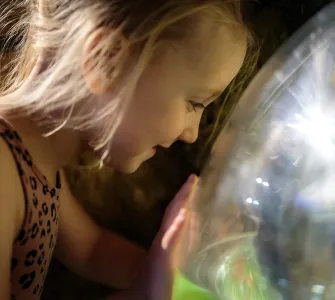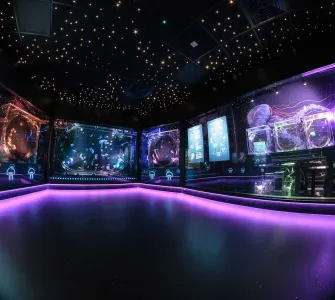At the end of 2018, Deep Aquarist Shoshana flew to New England Aquarium Rescue Centre on the East coast of America, to help rehabilitate cold stunned sea turtles.
Following months of intensive care, it is now time for some of the turtles to be released back into the ocean and Shoshana has once again taken the trip to America to assist the care team.
Yesterday Shoshana assisted the team with the release of turtle number 266 at Nantucket Sound in Cape Cod, dubbed ‘Munchkin’ by the rescue staff. She is largest loggerhead to ever come through the centre, weighing 137kg on arrival (increasing to 151kg in the last few months). Munchkin was found off Great Island, Massachusetts.
Munchkin was admitted with significant wounds to her right flipper. She was nearly unconscious when she was rescued and brought into the centre. She is also missing portions of her right front flipper and left hind flipper from suspected entanglement damage. No one knows exactly why munchkin was stranded, but it is thought that the drop in her body temperature due to being cut off from warmer waters led to her becoming sick and hypothermic.
Using ultrasound technology, the vets were able to determine that her heart was still functional. So her treatment began. Turtle treatment can last from several months to two years, until they are healthy enough to be released back into the ocean.
Shoshana tells us more: “Pictures and descriptions can’t adequately describe how incredible Munchkin is. I remember the sense of awe that I felt when I saw her for the first time back in 2018. I was so excited to work with her and in some small way contribute to her rehabilitation.
“The extraordinary staff at The New England Aquarium Rescue Centre provide an exceptional standard of care to hundreds of turtles every year and this is no exception when it came to Munchkin. To be able to share in celebrating their success and hard work with the ending of her rehabilitation and then her release is beyond rewarding and a once in a lifetime experience.
“It’s these moments that overwhelm us with emotion and show us the types of things we can accomplish by working together. They inspire us and the only thing I can say is that I am so thankful to both The Deep and The New England Aquarium that I can be a part of something so special, so inspiring and full of hope.”
Before her release, Munchkin was fitted with a satellite tag so the care team can watch her progress and see where she goes. Loggerheads migrate for thousands of miles, but gaining data on a turtle at this stage of life is extremely rare. She has the capability to cover long distances in the coming months and provide vital data on congregation points and movement areas.
The ocean and sea turtles like Munchkin are facing accelerating threats like rapidly rising water temperatures from climate change, islands of floating plastic and ocean industrialisation. It is hoped by telling Munchkins story, we will help to inspire everyone to take action.
You can read more about Munchkins journey here https://www.neaq.org/about-us/mission-vision/munchkinsjourney/?fbclid=IwAR0EUzt7YKQeQ2PTxilPGFxS5gC-eG1hK7H9ahuOoAPATSFQggwBSieBnrw.
-ends-
For more information, please contact Zoe Montgomerie, Marketing Officer at The Deep on 01482 381093 or email zoe@thedeep.co.uk.
Notes to Editors
In the months of November and December, the centre took in over 400 turtles, all of which needed immediate care and were suffering from hypothermia, emaciation, dehydration and other injuries.
All of these animals had become trapped by the hook shape of Cape Cod Bay and become disorientated, meaning they can’t make their way to warmer waters as temperatures started to drop. By mid-November, the water reached 10°C meaning the turtles were too cold to eat, drink or swim so become cold-stunned, often stranding on the beach. Often they are suffering from life-threatening hypothermia, emaciation, dehydration or injuries.
When the turtles arrive at the centre, their body temperature is taken and heart rate checked. It’s important to warm the turtle’s slowly as increasing their temperature too quickly could be harmful. When they come in, they are placed in pools at 12.5°C, this is then increased by 3 degrees each day until they are well enough to go into the largest pool, which is maintained at 22°C.




